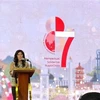Despite more than 40 years of environmental management in the ASEAN region, degradation of the environment continues, affecting the most vulnerable populations, a senior policy advisor for the Institute for Global Environment Strategies said on August 3 at a climate-change forum held in Vientiane, Laos.
Dr Peter King said that climate change continued to be a massive threat to the region, while the rate of loss of biodiversity had slowed only a little.
Freshwater quality and quantity also continued to degrade in highly urbanised and industrial areas, though some progress had been made.
However, environmental governance has been poorly implemented, King said.
While environmental agencies have been created, laws enacted and various environmental programme initiated, "too many actors continue to disregard the environment", he said. "A massive change in mindset is needed for sustainable development," he added.
Speaking at the forum, Sokmao Chheang, a researcher at the Centre for Development-Oriented Research in Agriculture and Livelihood Systems in Cambodia, said information about innovation and new climate-change technologies should be provided to farmers in affected areas.
Irregular rainfall
He said his centre, with funding provided by the Thailand Environment Institute, conducted a study on how farmers in rain-fed ecosystems made a living during irregular rainfall.
The study examined 360 farmer households in nine districts in the central province of Kampong Speu, the southern province of Kampot, and the southwestern province of Takeo in Cambodia.
Rainfall patterns during the past 15 years changed remarkably, with drought, flooding and irregular rainfall making farming much more vulnerable, the study found.
Farmers faced insufficient rainfall during the early part of the monsoon season, causing delays during the mid-monsoon season in August-October.
The consequence was that rice could not produce more stems, leading to low yields, he said.
Le Thi Hoa Sen, Deputy Head of the Centre for Climate Change Study in central Vietnam, said the effect of non-seasonal and heavy flooding in Vietnam continued to affect small-scale farmers.
Increasing rainfall unpredictability, high input costs, high crop losses and recovery from adverse climate events take away income for crops. Regenerated rice has the potential to enhance resilience to climate change and generate a high-quality product with higher yields, increasing productivity and marketability, she said.
Sen said that a regenerated-rice farming model, used in a co-operative in Quang Binh province, had been successful.
After 50-55 days of implementation, the households experienced a 5 percent productivity increase, an overall cost reduction of 20 percent, an additional income of 2.5 million VND per 100 ducks sold, and overall reduction of labour costs for cultivation.
Households and co-operatives also received technical training and were given packaging and processing roles for marketing products. Rice-storage facilities were also built.
More than 100 researchers, experts from associations, institutes, and universities in Laos, Thailand, Cambodia, China, Vietnam and Myanmar attended the forum.-VNA
Dr Peter King said that climate change continued to be a massive threat to the region, while the rate of loss of biodiversity had slowed only a little.
Freshwater quality and quantity also continued to degrade in highly urbanised and industrial areas, though some progress had been made.
However, environmental governance has been poorly implemented, King said.
While environmental agencies have been created, laws enacted and various environmental programme initiated, "too many actors continue to disregard the environment", he said. "A massive change in mindset is needed for sustainable development," he added.
Speaking at the forum, Sokmao Chheang, a researcher at the Centre for Development-Oriented Research in Agriculture and Livelihood Systems in Cambodia, said information about innovation and new climate-change technologies should be provided to farmers in affected areas.
Irregular rainfall
He said his centre, with funding provided by the Thailand Environment Institute, conducted a study on how farmers in rain-fed ecosystems made a living during irregular rainfall.
The study examined 360 farmer households in nine districts in the central province of Kampong Speu, the southern province of Kampot, and the southwestern province of Takeo in Cambodia.
Rainfall patterns during the past 15 years changed remarkably, with drought, flooding and irregular rainfall making farming much more vulnerable, the study found.
Farmers faced insufficient rainfall during the early part of the monsoon season, causing delays during the mid-monsoon season in August-October.
The consequence was that rice could not produce more stems, leading to low yields, he said.
Le Thi Hoa Sen, Deputy Head of the Centre for Climate Change Study in central Vietnam, said the effect of non-seasonal and heavy flooding in Vietnam continued to affect small-scale farmers.
Increasing rainfall unpredictability, high input costs, high crop losses and recovery from adverse climate events take away income for crops. Regenerated rice has the potential to enhance resilience to climate change and generate a high-quality product with higher yields, increasing productivity and marketability, she said.
Sen said that a regenerated-rice farming model, used in a co-operative in Quang Binh province, had been successful.
After 50-55 days of implementation, the households experienced a 5 percent productivity increase, an overall cost reduction of 20 percent, an additional income of 2.5 million VND per 100 ducks sold, and overall reduction of labour costs for cultivation.
Households and co-operatives also received technical training and were given packaging and processing roles for marketing products. Rice-storage facilities were also built.
More than 100 researchers, experts from associations, institutes, and universities in Laos, Thailand, Cambodia, China, Vietnam and Myanmar attended the forum.-VNA



















